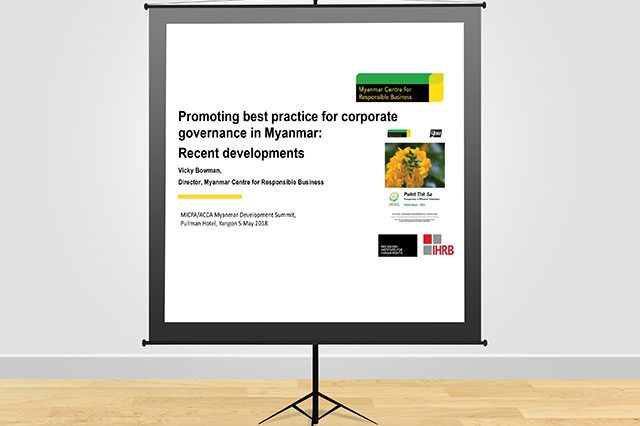Companies Need Professional Advisers to Improve Corporate Governance – and They Need to Budget for Them

On 5 May, Vicky Bowman spoke to the Myanmar Development Summit at Pullman Hotel Yangon, co-hosted by the Myanmar Institute of Certified Public Accountants (MICPA) and the Association of Chartered Certified Accountants (ACCA) which this year was focussed on ‘Global Standards and their Impact on Economic Development and Responsible Business Practices’.
The Myanmar Development Summit is a joint forum by MICPA - Myanmar’s national accounting body, and ACCA – the global body for finance professionals. The summit also marked the collaboration between ACCA and MICPA since early 2013. It covered topics such as: the role of IFRS in supporting business growth in emerging markets; the opportunities, challenges and areas for growth in the Myanmar development agenda; corporate governance and its best practices; and creating sustainable capital markets and its best practices.
Vicky’s presentation highlighted recent developments in Myanmar to improve corporate governance and transparency which are summarised in MCRB’s recent Pwint Thit Sa/Transparency in Myanmar Enterprises report. This includes regulatory changes introduced in the 2017 Companies Law (whose draft Regulations are under consultation until 31 May); the 2016 Myanmar Investment Law and 2017 Rules; requirements for Environmental Impact Assessment (EIA); and reforms to the Anti-Corruption Law which are currently under discussion in the Hluttaw/Parliament.
She also highlighted initiatives such as the launch of the Myanmar Institute of Directors, Myanmar’s continued participation in the Extractives Sector Transparency Initiative (EITI), and the pilot project planned for the Construction Sector Transparency Initiative (CoST) in Myanmar. She linked these to international trends, in particular towards compulsory non-financial reporting.
She highlighted particular concerns from watchdog bodies such as Parliament and civil society bodies, including the design, tendering and oversight/audit of public procurement and government projects, particularly construction; misreporting of extractives revenues; ‘CSR’ budgets used for corrupt purposes; and the importance of freedom of expression to promote government accountability through media and civil society reporting of corruption and misgovernance. She noted that the continuing use of Article 66(d) of the Telecommunications Law (online defamation) was undermining the priority the new President U Win Myint placed on fighting corruption.
Finally, she noted that it is essential for Myanmar companies to recognise the role that professional advisers play in assisting them to improve corporate governance, in particular auditors. Reliable audit reports are needed for a Board of Directors to exercise their duties to act with care and diligence. Audited reports also need to be filed to meet regulatory requirements. An audit conducted to the appropriate standard can cost a significant amount more than many Myanmar companies are currently paying, judging by the professional fees they report in their annual accounts. The 2017 Report on Observance of Standards and Codes (ROSC): Accounting and Auditing by the World Bank, which was prepared in active collaboration with the Office of the Auditor General of the Union, the Myanmar Accountancy Council and the MICPA, identified concerns about audit quality, auditor independence and the low level of audit fees all of which have major corporate governance implications. MCRB’s 2018 Pwint Thit Sa report encourages the government and others to implement the ROSC recommendations.
 English
English မြန်မာ
မြန်မာ မြန်မာ (unicode)
မြန်မာ (unicode)








